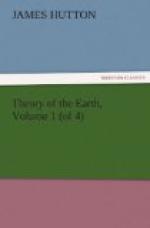Upon the one extremity of our land, there is no increase, or there is no accession of any mineral substance. That place is the mountain-top, on which nothing is observed but continual decay. The fragments of the mountain are removed in a gradual succession from the highest station to the lowest. Being arrived at the shore, and having entered the dominion of the waves, in which they find perpetual agitation, these hard fragments, which had eluded the resolving powers natural to the surface of the earth, are incapable of resisting the powers here employed for the destruction of the land. By the attrition of one hard body upon another, the moving stones and rocky shore, are mutually impaired. And that solid mass, which of itself had potential liability against the violence of the waves, affords the instruments of its own destruction, and thus gives occasion to its actual instability.
In order to understand the system of the heavens, it is necessary to connect together periods of measured time, and the distinguished places of revolving bodies. It is thus that system may be observed, or wisdom, in the proper adapting of powers to an intention. In like manner, we cannot understand the system of the globe, without seeing that progress of things which is brought about in time, thus measuring the natural operations of the earth with those of the heavens. This is properly the business of the present undertaking.
Our object is to know the time which had elapsed since the foundation of the present continent had been laid at the bottom of the ocean, to the present moment in which we speculate on these operations. The space is long; the data for the calculations are, perhaps, deficient: No matter; so far as we know our error, or the deficiency in our operation, we proceed in science, and shall conclude in reason. It is not given to man to know what things are truly in themselves, but only what those things are in his thought. We seek not to know the precise measure of any thing; we only understand the limits of a thing, in knowing what it is not, either on the one side or the other.
We are investigating the age of the present earth, from the beginning of that body which was in the bottom of the sea, to the perfection of its nature, which we consider as in the moment of our existence; and we have necessarily another aera, which is collateral, or correspondent, in the progress of those natural events. This is the time required, in the natural operations of this globe, for the destruction of a former earth; an earth equally perfect with the present and an earth equally productive of growing plants and living animals. Now, it must appear, that, if we had a measure for the one of those corresponding operations, we would have an equal knowledge of the other.




